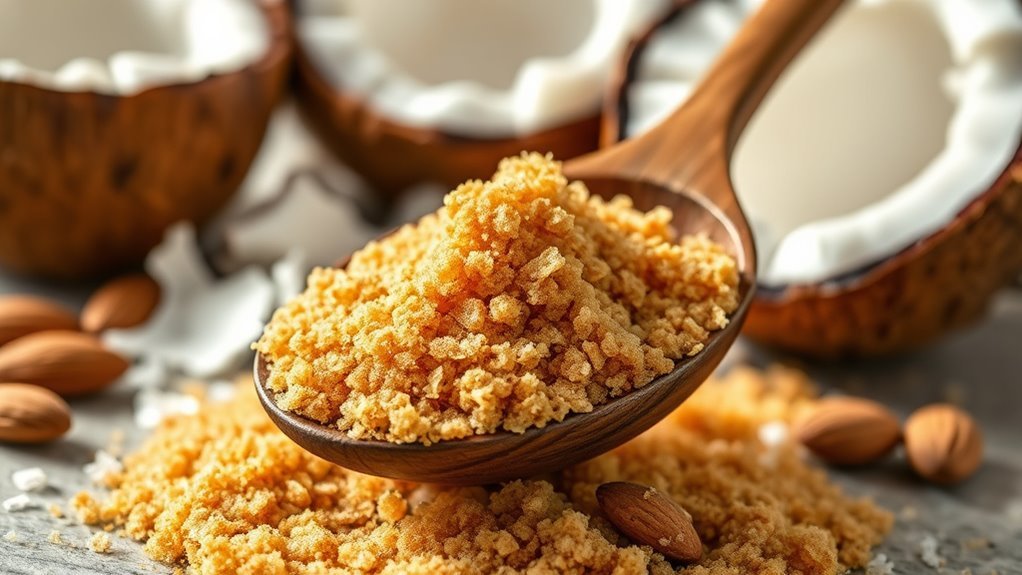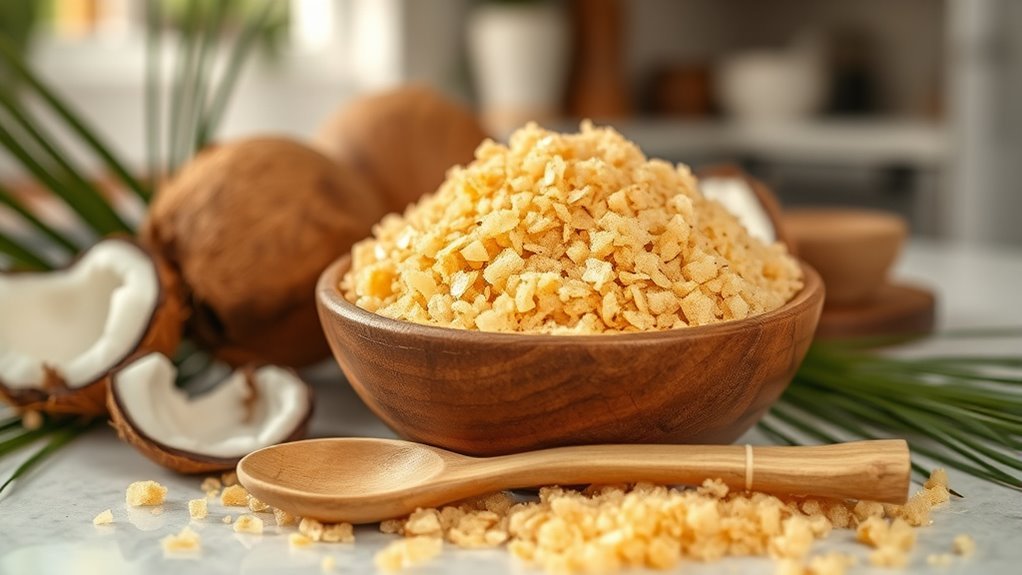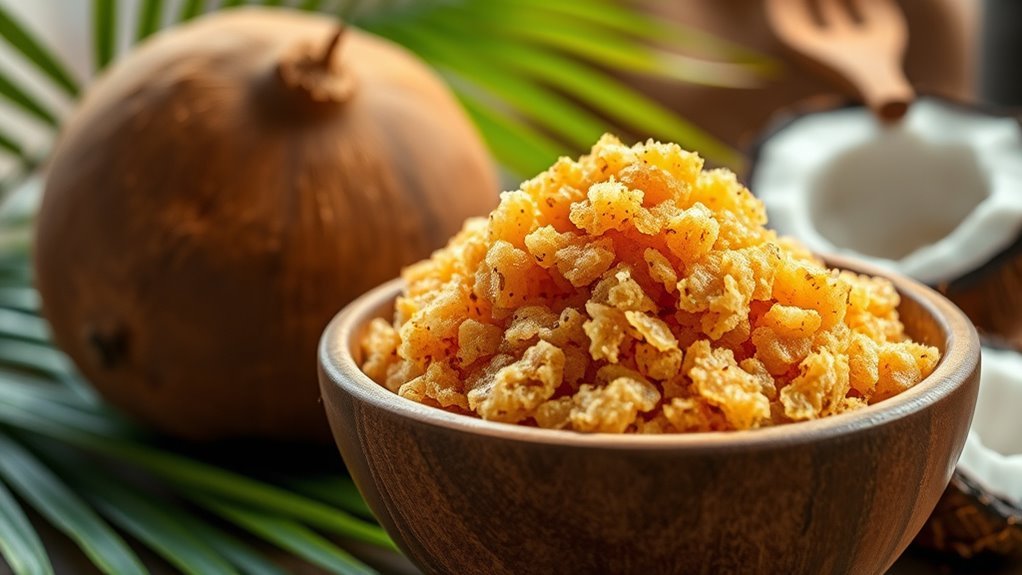Coconut sugar isn’t the best choice for a ketogenic diet. It contains about 15 grams of carbohydrates per tablespoon, which can greatly impact your daily carb limit. While it has a lower glycemic index than regular sugar, it can still raise blood sugar levels and disrupt ketosis. If you’re looking to manage your carb intake effectively, consider using coconut sugar sparingly or exploring alternative sweeteners. There’s more to discover about sweetener options that might suit your keto goals.
Nutritional Profile of Coconut Sugar

When evaluating the nutritional profile of coconut sugar, it’s important to contemplate its composition and how it compares to other sweeteners. Coconut sugar contains about 16 calories per teaspoon, primarily from carbohydrates. Unlike refined sugar, it retains some nutrients, like iron, zinc, and antioxidants, which can provide health benefits. Its glycemic index is lower than that of regular sugar, making it a popular choice for those seeking healthier alternatives. In cooking applications, coconut sugar works well in baking and as a sweetener for beverages, adding a unique caramel flavor. However, while it does offer some nutritional advantages, moderation is key, as it still contributes calories and carbohydrates to your diet.
Impact on Blood Sugar Levels

Although coconut sugar is often touted for its lower glycemic index compared to regular sugar, its impact on blood sugar levels can still be significant, especially for those following a ketogenic diet. While it may cause a slightly lower insulin response than white sugar, it’s still a carbohydrate source that can raise your blood sugar. If you’re managing your blood sugar levels, even small amounts can add up, potentially disrupting ketosis. Many people on a keto diet aim to keep their total carbohydrate intake very low to maintain stable blood sugar and minimize insulin spikes. Consequently, if you’re seeking freedom in your dietary choices, consider the potential effects of coconut sugar on your overall blood sugar management before incorporating it into your meals.
Carbohydrate Content and Ketosis

Coconut sugar contains approximately 15 grams of carbohydrates per tablespoon, which can considerably affect your daily carb limit on a ketogenic diet. If you’re focused on ketosis maintenance, it’s essential to be mindful of your carbohydrate sources. Here are a few points to take into account:
- Daily Carb Limit: Most keto diets restrict carbs to about 20-50 grams per day. A tablespoon of coconut sugar can take up a significant portion of that allowance.
- Glycemic Index: While coconut sugar has a lower glycemic index than regular sugar, its carbohydrate content still poses a risk to ketosis.
- Alternative Sweeteners: Exploring keto-friendly sweeteners can help you satisfy your sweet cravings without jeopardizing your carbohydrate intake.
Being informed about these factors can empower you to make better dietary choices on your keto journey.
Comparison With Other Sweeteners
While many people look for sweeteners that fit within a ketogenic diet, it’s crucial to compare coconut sugar with other options that have minimal impact on carbohydrate intake. Coconut sugar may be a natural option, but it contains about 12 grams of carbs per tablespoon, which can hinder ketosis. In contrast, sweetener alternatives like erythritol and stevia offer zero calories and carbs, making them more suitable for keto enthusiasts. Agave nectar and honey, while natural, also pack a carb punch that could disrupt your goals. Ultimately, your sweetener preferences should align with your dietary needs. When pursuing a keto lifestyle, consider using coconut sugar sparingly if you prefer its flavor, but prioritize lower-carb options for consistent results.
Practical Tips for Using Coconut Sugar on Keto
If you find yourself drawn to the flavor of coconut sugar but are mindful of your carb intake, using it strategically can help you stay within your ketogenic goals. Here are some practical tips to contemplate:
- Portion Control: Limit your use to a small amount, as even a teaspoon can add significant carbs.
- Cooking Techniques: Incorporate coconut sugar in recipes that require minimal sweetness, like marinades or dressings, to enhance flavor without overdoing it.
- Balance with Other Sweeteners: Mix coconut sugar with low-carb sweeteners to reduce overall carb content while still enjoying its distinct taste.
Frequently Asked Questions
Can Coconut Sugar Be Used in Baking for Keto Recipes?
Coconut sugar isn’t the best choice for keto baking, as it contains carbs that can disrupt ketosis. Instead, you might want to take into account coconut sugar substitutes like erythritol or monk fruit sweetener. These keto baking alternatives provide sweetness without the carbs, allowing you to enjoy your treats without guilt. Always check labels for net carbs to keep your recipes aligned with your keto goals. Enjoy the freedom of tasty, low-carb baking!
What Is the Glycemic Index of Coconut Sugar?
You might think coconut sugar’s a healthier choice, but its glycemic index is around 54, which means it can still spike your blood sugar. While it’s touted as a natural sugar alternative, its glycemic impact isn’t that far from regular sugar. If you’re looking for truly keto-friendly options, consider low-glycemic sweeteners like stevia or erythritol. They offer sweetness without the sugar crash, giving you the freedom to indulge without the guilt.
Does Coconut Sugar Contain Any Vitamins or Minerals?
Yes, coconut sugar does contain some vitamins and minerals, contributing to its nutritional profile. It’s particularly rich in potassium, magnesium, zinc, and iron, which can offer certain health benefits. While it’s not a replacement for a balanced diet, these nutrients may support overall health. Just remember, moderation is key since coconut sugar still contains calories and carbohydrates, so it’s essential to be mindful of your intake, especially if you’re following specific dietary guidelines.
Is Coconut Sugar Vegan-Friendly?
Yes, coconut sugar’s often considered vegan-friendly. It’s derived from the sap of coconut blossoms, and its production is generally mindful of sustainability. The process involves minimal harm to the trees, ensuring they continue to thrive. While it’s a sweet treat with a lower environmental footprint than refined sugars, remember that not all brands may adhere to the same ethical practices. It’s wise to check the sourcing to align with your values.
How Does Coconut Sugar Compare to Raw Sugar?
Coconut sugar offers some benefits over raw sugar, like a lower glycemic index and trace minerals. However, it still contains calories and carbohydrates, which can be drawbacks for those watching their intake. While it might be a more natural option, you shouldn’t assume it’s a healthier choice overall. It’s essential to evaluate moderation and balance in your diet, as both types of sugar can impact your health if consumed excessively.
Is coconut sugar keto-friendly?
Coconut sugar is not considered keto-friendly due to its relatively high carbohydrate content. While it is a natural sweetener and has a lower glycemic index than refined sugar, it still contains about 12 grams of carbohydrates per tablespoon. On a strict ketogenic diet, where the daily carb intake is typically limited to 20-50 grams, consuming coconut sugar can easily exceed this limit.
What is the glycemic index of coconut sugar?
Coconut sugar has a glycemic index (GI) of approximately 35, which is lower than that of regular table sugar (with a GI of around 60-65). However, for those on a keto diet, the glycemic index of a food is less critical than its total carbohydrate content. Therefore, while it may not spike blood sugar as much as other sugars, it still contains carbs that can affect ketosis.
Can I use coconut sugar in moderation on a keto diet?
While some people may choose to use coconut sugar in moderation, it is generally not recommended for strict keto dieters. If you do decide to include it, it’s crucial to carefully monitor your carbohydrate intake to avoid exceeding your daily limit. Alternatives like erythritol or stevia provide sweetness without the carbs and are more aligned with ketogenic guidelines.
Are there any health benefits to coconut sugar?
Coconut sugar contains trace amounts of vitamins and minerals, including iron, zinc, calcium, and potassium, along with antioxidants. However, the quantities are relatively low, and the health benefits are not significant enough to offset its carbohydrate content for those on a keto diet. It’s important to prioritize low-carb sweeteners to maintain ketosis.
What are some keto-friendly alternatives to coconut sugar?
Some popular keto-friendly alternatives to coconut sugar include erythritol, stevia, monk fruit sweetener, and allulose. These sweeteners provide a similar sweetness profile without the high carbohydrate content, making them suitable for a ketogenic lifestyle. Always check labels to ensure there are no hidden carbs in the products you choose.
References
- https://www.healthline.com/nutrition/coconut-sugar-keto
- https://www.ncbi.nlm.nih.gov/pmc/articles/PMC5788961/
- https://www.webmd.com/diet/health-benefits-coconut-sugar
- https://www.medicalnewstoday.com/articles/321370
- https://www.dietitiansofcanada.ca/YourHealth/Resources/Coconut-Sugar
- https://www.clevelandclinic.org/health/articles/what-is-coconut-sugar
- https://www.livescience.com/coconut-sugar.html


